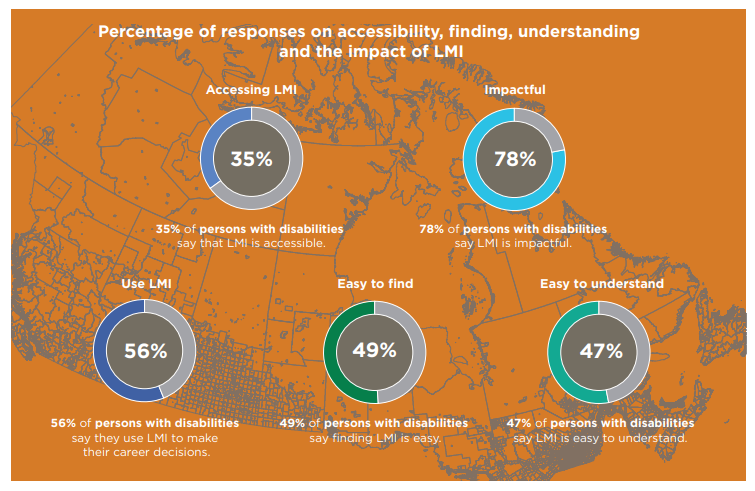Table of Contents
Key Findings
- Approximately two thirds (65%) of respondents said that labour market information is not accessible due to their disability.
- “Workplace environment” is the third most frequently sought after type of LMI by persons with disabilities, after wages and skill requirements.
- One out of three respondents surveyed note that existing LMI is not relevant to their situation.
Introduction
Box 1: Identifying persons with disabilities
To understand how Canadians use labour market information and what they find lacking in the current system, the Labour Market Information Council (LMIC) surveyed nine distinct user groups. One group was persons with disabilities. Respondents were asked to self-identify as having a disability according to the definition from the Canadian Disability Benefit:
As a result, we canvassed a total of 1,327 persons with disabilities, of whom approximately 80% indicated that their disability affects their ability to look for work.
Challenges in accessing, finding and understanding LMI
We asked respondents about the challenges and impact labour market information has had on their career planning. Only 35% of persons with disabilities indicated that, given their disability, relevant job market information is accessible (see Figure 1). Although a range of factors affects a person’s decision to participate in the labour market, both employers and LMI providers could address the first step. Improving the first and perhaps most important part of the job search process — access to LMI — could encourage persons with disabilities to look for career opportunities that align with their skills and interests.
Room to improve LMI for persons with disabilities
To better understand how Canadians use LMI and what they find lacking in the current system, the Labour Market Information Council (LMIC) surveyed nine distinct user groups, including persons with disabilities. The figure below presents a summary of LMI perceptions among those persons with disabilities surveyed.
Figure 1. One-third of respondents said disability limits their access to LMI

Making LMI accessible is important since survey respondents indicated that labour market information is widely used. Over half of respondents (56%) indicated that they use labour market information. Nearly four out of five (78%) reported that it has had at least some impact on their career path. However, persons with disabilities face many of the same challenges as other user groups. For example, 51% of those with disabilities reported that LMI is difficult to find (49% said it was easy to find), while 53% said that the LMI they did find is difficult to understand (47% said it was easy to understand).
Looking for wages, skills and work environment information
To understand which types of LMI need to be made more accessible, we asked persons with disabilities to identify the information most important to them. We found that the top four LMI needs of persons with disabilities are the same as for the general employed population. Wages are the most sought after piece of information, followed by the skill requirements of jobs, workplace environment and benefits (see Figure 2). The two groups differed slightly on the relative importance of these types of LMI, as persons with disabilities identified wages and benefits as key needs about 10% less often than those in our survey of employed persons. Overall, our findings confirm that the types of labour market information needed are similar across user groups.
Figure 2. Top LMI needs similar across user groups
Top four most cited LMI needs for persons with disabilities and employed persons
Note: The employed person survey did not distinguish between persons with and without disabilities.
Addressing the LMI gap for persons with disabilities
Before we can discuss how to improve the accessibility of LMI, we need to understand the types of LMI challenges that persons with disabilities face. We found that one-third (33%) of respondents noted that existing LMI is not relevant to their situation (see Figure 3). Nearly one-quarter said that LMI lacks job-specific information (24%), is outdated (23%) or simply does not exist (23%). Improving the accessibility of LMI is an important first step and must happen in conjunction with efforts to eliminate challenges using this information. This will enable persons with disabilities to explore a wide range of career options and encourage them to participate in the labour force.
Figure 3. Top four LMI challenges
Top four types of challenges in finding labour market information
Note: The employed person survey did not distinguish between persons with and without disabilities.
Lessons learned for lowering barriers
Eliminating and preventing barriers enables all Canadians, and especially those with disabilities, to fully participate in workplaces and communities. As noted above, about 65% of persons with disabilities report facing challenges in simply obtaining labour market information. It is important to understand that when speaking of reducing barriers to accessibility, this includes access to LMI. Supporting persons with disabilities to enter and remain in the workforce could improve their quality of life and bring substantial benefits to the broader economy, especially considering the numerous reports of labour market shortages across Canada (see Box 2).
Box 2: Addressing labour and skills shortages
There are about 3.7 million persons with disabilities between the ages of 25 and 64 in Canada (2017), 59% of whom are employed. If we could increase the employment rate of persons with disabilities to the level of those without disabilities (80%), we could potentially add 1.1 million new workers to the labour force.
The way forward
One of our primary objectives at the Labour Market Information Council is to improve the availability of LMI to all Canadians. More than just identifying the informational needs of those using LMI, we must also address the challenges that Canadians face in accessing LMI. This is particularly true for members of underrepresented populations, such as persons with disabilities. To this end, LMIC plans to provide local, granular, frequent and timely LMI through a variety of mediums, tailored to meet the needs of distinct user groups across Canada.
The survey results reported here provide a first step towards understanding how persons with disabilities use LMI in making important labour market decisions. Going forward, LMIC will continue to release publications and dashboards on how LMI is used by different groups, highlighting the common and diverse LMI needs of Canadians.
Acknowledgements
This LMI Insight Report was prepared by Young Jung of LMIC. We would like to thank Emile Tompa, Kathy Padkapayeva (Institute for Work and Health), and Pamela Lahey (Employment and Social Development Canada) for their feedback. For more information about LMI Insights or other LMIC activities, please check out our publications page. You may also contact Anthony Mantione at anthony.mantione@lmic-cimt.ca or Tony Bonen (Director, Research, Data and Analytics) at tony.bonen@lmic-cimt.ca. Check out the survey dashboard and previous LMI Insight Reports on employers, students and parents. Additional results will be made available as analyses are completed.


